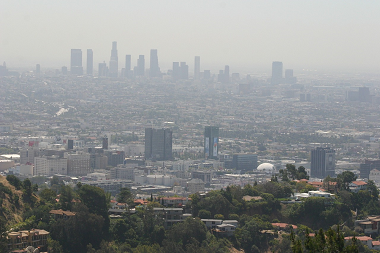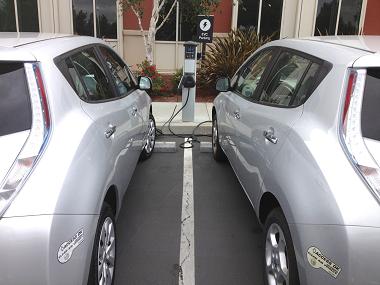
Coastal Commission Reform Stalls in the Legislature
The Fight for Clean Air Encounters Setback
Rev Up EV Report Released

Coastal Commission Reform Stalls in the Legislature
By Kyle Jones
Two bills designed to restore public confidence in the California Coastal Commission were killed by powerful developer and oil industry lobbyists this legislative session.
Assembly Bill 2002 (AB 2002), by Mark Stone, Toni Atkins, and Marc Levine, would have required consultants who influence the commission to register as lobbyists. Senate Bill 1190 (SB 1190), by Hannah-Beth Jackson, would have ended the practice of ex parte, or private, communications between individuals and commissioners while the commission is presiding over quasi-judicial matters, which are similar to court cases.
For 40 years, the Coastal Commission has been charged with preserving the California coast for all Californians. Key among commission activities is reviewing proposed developments for consistency with the Coastal Act.
Public trust in the commission has been eroding over the past few years as powerful consultants for developers have been able to use the commission’s weak disclosure rules to undermine the commission staff’s work to uphold the Coastal Act. The February firing of the executive director and coastal champion, Dr. Charles Lester, highlighted the urgent need to reform the commission.
AB 2002 directly modified the Political Reform Act, and thus needed a two-thirds supermajority to pass each house of the legislature. Despite appearing to face a significant hurdle, that bill secured the necessary 54 votes to pass the Assembly. SB 1190, which only needed a majority vote, had a smoother time moving through the Senate, passing the Senate floor with two more votes than it needed.
As both bills moved to their second house, chances for success grew grim. SB 1190, which had no cost in the Senate, was found to have significant cost pressures in the Assembly, based on the Natural Resources Agency’s analysis. It was placed on the suspense file, which is best described as political purgatory.
In response, AB 2002 was temporarily shelved by the Senate. SB 1190 was eventually released from the Assembly Appropriations committee after amendments were negotiated, but by then a coalition of opposition had formed against both bills.
The opposition, led by the same powerful coastal consultants who have benefited from private communications and not having to register as lobbyists, were joined by a prominent labor lobbyist, developers, and the oil industry, to wage a deceptive war against SB 1190. Their tactic was to distort the bill’s effects and mislead legislators about how the Coastal Act and commission operate. In the end, the bill failed, receiving only 15 of the 41 needed votes to pass the Assembly.
After SB 1190’s crushing defeat, the opposition set their sights on AB 2002. That bill needed a two-thirds vote, which meant the opposition only had to pluck a few members off the bill. In the end, this bill succumbed to the poaching, receiving only 22 of the 27 votes needed to pass.
While both bills are dead, the need and passion for Coastal Commission reform remains alive. We will continue to work hard on this issue, and look forward to finding a path forward for this in the years to come.

The Fight for Clean Air Encounters Setback
By Diana Vazquez
Last year, a conservative block of local elected officials—with what appears to be help from the oil industry—began to take over control of the South Coast Air Quality Management District (SCAQMD), the entity responsible for making sure the air in Southern California is safe to breathe for about 17 million residents.
This past February, after the conservatives gained control of SCAQMD, they quickly moved to fire the board’s executive director and to rewrite and weaken air pollution control regulations.
Senate President Pro Tem Kevin de León responded with Senate Bill 1387 (SB 1387), which proposed to add three new state appointments to the SCAQMD who would add a needed public health and environmental justice perspective to the board. The hope was that the new appointees would ensure that the most impacted communities in the South Coast basin would be heard and better represented.
Southern California has among the dirtiest air in the nation. As a result, more than 5,000 people in the region die prematurely from poor air quality-related diseases every single year. The dirty air disproportionately impacts low-income people and communities of color, which are often located near some of the worst pollution sources.
SB 1387 moved through the Senate and won one vote more than it needed to pass off that floor. On its trip through the Assembly, it continued to move through committees, with support from environmental and health organizations and opposition from trade associations representing various regulated industries, from paint manufacturers to oil producers.
Sierra Club organizers working with the My Generation Campaign organized in-district contact with legislators and alerted Club members. Thousands of Sierra Club members and allies contacted their legislators as the last few weeks of the legislative session proceeded and legislators were considering their positions, and Sierra Club California advocates and allies walked the halls and met with legislators and their staffs to explain the bill.
The effort, though, wasn’t able to overcome strong industry opposition.
In the last few hours of the legislative session on August 31, SB 1387 finally came to a vote on the Assembly floor and met a sad demise. The vote was 30 votes for the bill, coming up 11 votes short of passage.
Proponents, including Sierra Club California, defended the bill as a necessary step to add community voices to the Air District board.
Yet opponents of the legislation decried the bill as a tool to rob local boards of their control and pack the air board with appointees friendly to environmental interests.
Despite this defeat, Senator de León vowed to fight on.
We do too.

By Kathryn Phillips
Earlier this year, you may have read in this newsletter a request for volunteers to participate in a project by Sierra Club’s national electric vehicle team to see how auto dealers are performing as they try to sell electric vehicles (EVs).
Now the results of that project have been released as the online report called Rev Up Electric Vehicles: Multi-State Study of the Electric Vehicle Shopping Experience.
A total of 174 Sierra Club volunteers located in 10 states participated in the project and called or visited 308 different auto dealerships or stores carrying autos from manufacturers who are making electric vehicles. In total, 13 automakers were represented.
Then the volunteers reported back their experience. The results show that there is a lot of room for improvement by dealers and automakers. Nearly half the time, dealers didn’t have EVs prominently displayed, and 14 percent of the time, if they did have EVs on the lot, the dealers hadn’t charged the car sufficiently to allow a test drive.
Since research shows that test driving is the best way for consumers to get to know how electric vehicles operate and opens the path for them to consider buying one, not having vehicles available to test drive is a key barrier to selling the cars.
California dealerships that had cars on the lot had, on average, two-and-a-half times more vehicles available than dealerships in the other states that have adopted California’s Zero-Emission Vehicle regulation.
The report includes a list of top-performing dealerships, and a list of suggested actions by dealers, automakers and regulatory agencies and states to improve consumer access to EVs.
Check out the report and, if you were one of the Club members who participated in the project, pat yourself on the back for a job well done.
Follow Us:
  |
Thank you for being a part of our work! You may securely donate online or by sending a check to Sierra Club California at 909 12th Street, Suite 202, Sacramento, CA 95814.
